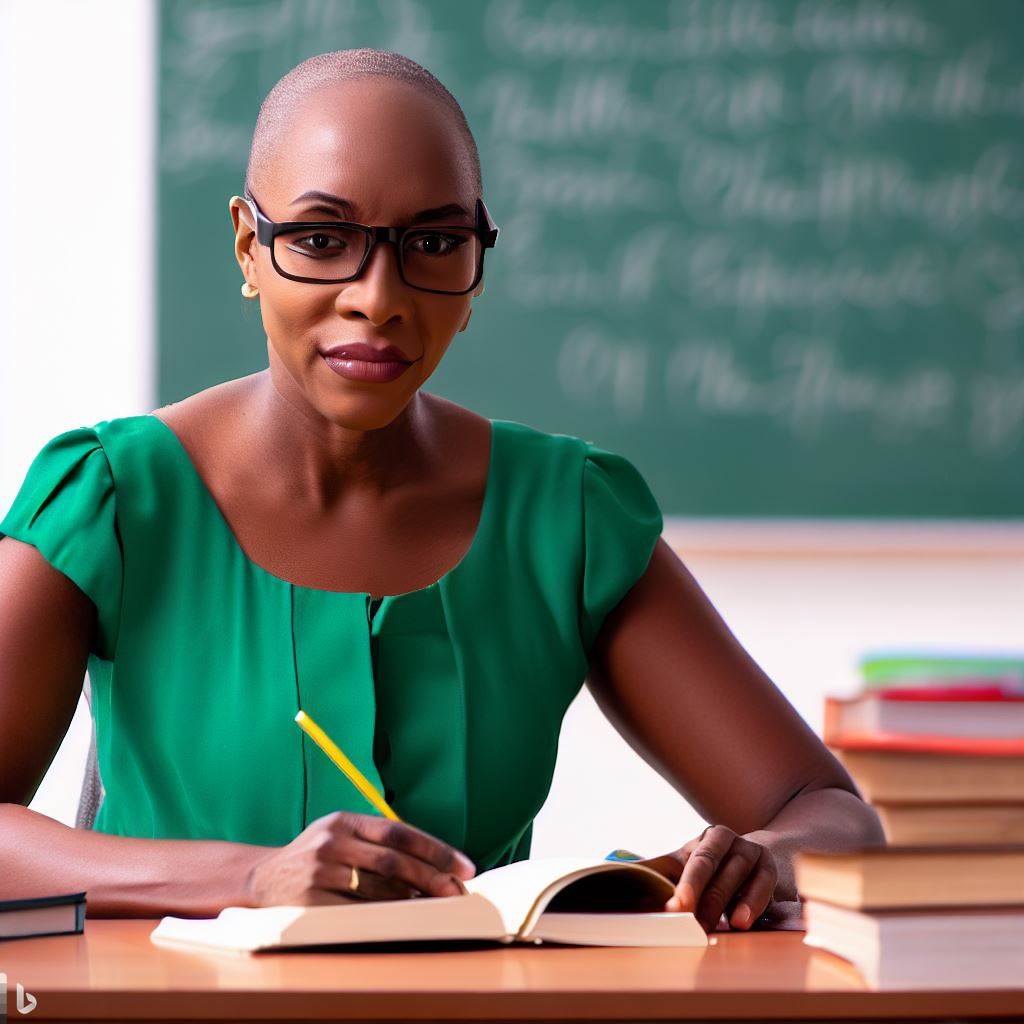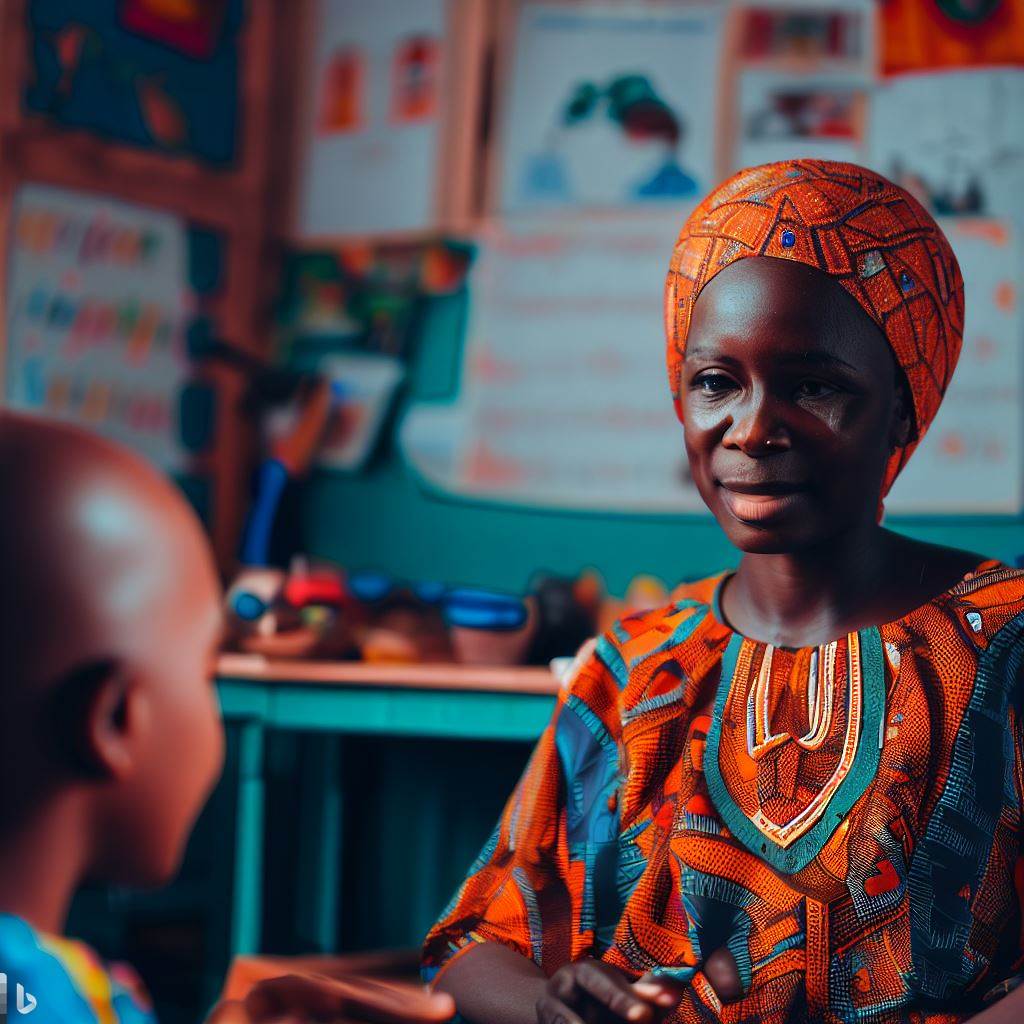Introduction
Special education refers to the practice of educating students with disabilities in a way that meets their individual needs.
Nigeria’s education system consists of three levels – primary, secondary, and tertiary, with varying curriculums and standards.
Special education teachers play a vital role in providing individualized support and instruction to students with disabilities.
Special education teachers have the knowledge and skills to modify curriculum and teaching methods to accommodate diverse learning needs.
They create inclusive environments that promote the social, emotional, and academic development of students with disabilities.
These teachers collaborate with other professionals, parents, and caregivers to develop individualized education plans (IEPs) for students with special needs.
Special education teachers advocate for the rights and inclusion of students with disabilities within the education system.
They provide ongoing assessments to monitor student progress and make necessary adjustments to instructional strategies.
In Nigeria, the role of special education teachers is crucial in ensuring equal educational opportunities for all students.
In the end, special education teachers play a significant role in Nigeria’s education system by providing tailored instruction and support to students with disabilities.
Qualifications and Training of Special Education Teachers in Nigeria
A. Required educational background
Special education teachers in Nigeria are required to have a bachelor’s degree in special education or a related field.
They should also have a strong foundation in subjects like psychology, child development, and educational technology.
This educational background helps them understand the unique needs of students with disabilities.
B. Certification and licensing process
After obtaining the required educational background, aspiring special education teachers need to undergo certification and licensing processes.
These processes are conducted by the Nigerian Teachers’ Registration Council (TRCN), the regulatory body for teachers in the country.
The TRCN ensures that special education teachers meet the necessary standards and competencies to work in the field.
C. Professional development opportunities
Special education teachers in Nigeria are encouraged to participate in continuous professional development activities.
These opportunities help them enhance their knowledge and skills in working with students with disabilities.
Professional development workshops, seminars, conferences, and online courses are available for special education teachers.
D. Challenges and government initiatives to address them
Special education teachers in Nigeria face several challenges in their role. One of the major challenges is the lack of resources and support for students with disabilities.
However, the government has taken initiatives to address these challenges.
For example, in 2019, Nigeria launched the Inclusive Education Policy to promote the inclusion of students with disabilities in mainstream schools.
The policy provides guidelines for the training and deployment of special education teachers.
The government also aims to improve infrastructure, provide assistive devices, and create a conducive learning environment for students with disabilities.
These initiatives are crucial in improving the role and effectiveness of special education teachers in Nigeria.
Read: Understanding the Nigerian Special Education Curriculum
Responsibilities of Special Education Teachers in Nigeria
A. Individualized Education Program (IEP) development and implementation
Special education teachers in Nigeria are responsible for developing and implementing IEPs for students with special needs.
They create personalized plans that address the specific learning goals and needs of each individual student.
B. Assessing and diagnosing students with special needs
Another crucial responsibility of special education teachers in Nigeria is to assess and diagnose students with special needs.
They conduct evaluations and use various assessment tools to determine the specific needs and challenges faced by each student.
C. Collaborating with other professionals and parents/guardians
Special education teachers play a vital role in collaborating with other professionals, such as speech therapists, occupational therapists, and psychologists, to provide holistic support to students.
They also work closely with parents and guardians to ensure a collaborative approach towards student success.
D. Creating inclusive learning environments
Creating inclusive learning environments is a significant responsibility of special education teachers in Nigeria.
They strive to create a safe and welcoming environment that promotes diversity, respects differences, and fosters a sense of belonging for all students.
E. Providing instructional support and adaptations
Special education teachers offer instructional support and adaptations to meet the individual needs of students with special needs.
They modify instructional materials, employ assistive technologies, and use various teaching strategies to ensure effective learning for all students.
F. Monitoring progress and conducting assessments
Special education teachers continuously monitor the progress of students with special needs and conduct regular assessments to determine their growth.
They use data-driven insights to make informed decisions and modify instructional approaches as needed.
In fact, special education teachers in Nigeria have multifaceted responsibilities that contribute to the overall development and success of students with special needs.
From developing personalized education plans to creating inclusive learning environments, their dedication and expertise play a crucial role in ensuring equal educational opportunities for all students.
Read: The Challenges and Triumphs of Special Ed Teachers in Nigeria
Techniques and Strategies Utilized by Special Education Teachers in Nigeria
A special education teacher plays a crucial role in providing individualized support to students with disabilities in Nigeria.
To effectively cater to the diverse needs of their students, these teachers employ various techniques and strategies.
In this section, we will explore the different methods used by special education teachers in Nigeria:
A. Differentiated instruction
Special education teachers in Nigeria embrace differentiated instruction as a key strategy to adapt their teaching to the unique learning styles and abilities of their students.
They tailor their lesson plans, assignments, and assessments to meet individual needs.
B. Assistive technology usage
Special education teachers in Nigeria utilize assistive technology to enhance their students’ learning experience.
They employ devices like text-to-speech software, speech recognition tools, and tablets to facilitate communication and improve accessibility.
C. Effective classroom management techniques
Special education teachers in Nigeria employ effective classroom management techniques to create a positive and inclusive learning environment.
They establish clear expectations, implement behavior reinforcement strategies, and provide structured routines.
D. Collaboration and team teaching approaches
Special education teachers in Nigeria recognize the importance of collaboration and team teaching.
They work closely with general education teachers, specialists, and support staff to develop individualized education plans and provide holistic support to students with disabilities.
E. Behavioral interventions and support
Special education teachers in Nigeria implement various behavioral interventions and support strategies to address challenging behaviors and promote positive social and emotional development.
They use techniques like positive reinforcement, social skills training, and counseling interventions.
F. Use of visual aids and multisensory teaching methods
Special education teachers in Nigeria employ visual aids and multisensory teaching methods to enhance learning and engagement.
They utilize tools like charts, graphs, manipulatives, and hands-on activities to reinforce concepts and accommodate diverse learning needs.
In a nutshell, special education teachers in Nigeria play a vital role in catering to the unique needs of students with disabilities.
They utilize differentiated instruction, assistive technology, effective classroom management techniques, collaboration, behavioral interventions, and visual aids to provide a supportive and inclusive learning environment for their students.
Read: Educational Qualifications for Special Education in Nigeria

Challenges Faced by Special Education Teachers in Nigeria
A. Lack of resources and funding
Special education teachers in Nigeria often face the challenge of inadequate resources and funding support.
The lack of proper educational materials, assistive devices, and technology tools hinders their ability to provide quality education tailored to meet the unique needs of their students.
Additionally, there is a limited budget allocated to special education, resulting in a scarcity of necessary resources and materials.
Read: A Comprehensive Overview of Special Education in Nigeria
B. Large class sizes and shortage of teachers
Special education teachers in Nigeria encounter difficulties due to large class sizes and a shortage of qualified professionals.
The overwhelming number of students in a single classroom makes it hard for teachers to provide individualized attention and personalized instruction.
Moreover, the scarcity of special education teachers exacerbates this issue, resulting in an insufficient student-teacher ratio.
C. Limited awareness and societal stigma towards special needs
Special education teachers in Nigeria face the challenge of limited awareness and societal stigma towards students with special needs.
Many people in Nigeria lack awareness and understanding of different disabilities, leading to stigmatization and discrimination against individuals with special needs.
This societal attitude creates barriers and negative perceptions that hinder the progress and inclusivity of special education.
D. Inadequate support systems and infrastructure
Special education teachers in Nigeria struggle with the lack of adequate support systems and infrastructure.
There is a deficiency in providing necessary support services such as occupational therapy, speech therapy, and counseling.
The absence of accessible infrastructure, including ramps and elevators, also poses mobility challenges for students with physical disabilities.
E. Need for further policy reforms and implementation
Special education teachers in Nigeria face the need for further policy reforms and their effective implementation.
While Nigeria has made strides in formulating special education policies, there is a lack of consistent and efficient implementation, resulting in a gap between policy and practice.
Additionally, there is a need for regular monitoring and evaluation of these policies to ensure they are effective and impactful.
In general, special education teachers in Nigeria encounter various challenges that impede their ability to provide quality education to students with special needs.
These challenges include a lack of resources and funding, large class sizes, limited awareness and societal stigma, inadequate support systems and infrastructure, as well as the need for further policy reforms and implementation.
Despite these challenges, special education teachers in Nigeria continue to remain dedicated and resilient in their quest to create an inclusive and empowering educational environment for every child.
Read: The Daily Life of a Special Education Teacher in Nigeria
Impact of Special Education Teachers in Nigeria
A. Improved academic and behavioral outcomes for students with disabilities
Special education teachers play a crucial role in improving the academic performance of students with disabilities.
They provide individualized instruction and support that caters to the specific needs of each student.
By utilizing various teaching strategies and techniques, they help students grasp and retain information effectively.
Special education teachers also implement behavior management plans to address challenging behaviors and promote a positive learning environment.
As a result, students with disabilities can achieve improved academic outcomes and develop appropriate social skills.
B. Enhanced quality of life and opportunities for students
Special education teachers greatly contribute to enhancing the overall quality of life for students with disabilities.
Through individualized support and instruction, they help students develop essential life skills and improve their independence.
By focusing on functional academics, vocational training, and self-advocacy, special education teachers empower students for a successful future.
Publish Your Professional Profile, Business or Brand
Showcase your expertise, gain trust, and boost visibility instantly on Professions.ng.
Publish NowThey also play a critical role in facilitating inclusion and creating opportunities for students to participate in co-curricular activities alongside their peers.
By promoting inclusivity, special education teachers ensure that students with disabilities can fully engage in society and lead fulfilling lives.
C. Empowerment of parents/guardians through collaboration
Special education teachers collaborate closely with parents/guardians as essential partners in supporting the educational journey of students with disabilities.
They provide guidance, resources, and strategies that enable parents/guardians to actively participate in their child’s education.
Special education teachers also help parents/guardians navigate the special education system and understand their child’s rights and entitlements.
By empowering parents/guardians, special education teachers foster a strong support system that positively impacts the overall well-being of students.
Collaboration between special education teachers and parents/guardians leads to improved educational outcomes and increased advocacy for students with disabilities.
D. Contribution to inclusive education and social integration
Special education teachers play a crucial role in promoting inclusive education and social integration for students with disabilities.
They actively advocate for inclusive practices within schools and society, ensuring that students with disabilities are not excluded or isolated.
By working closely with general education teachers, special education teachers facilitate the inclusion of students with disabilities in regular classrooms.
They provide support and resources to general education teachers to create inclusive learning environments that meet the diverse needs of all students.
Through their efforts, special education teachers contribute to the development of a more inclusive and accepting society for individuals with disabilities.
In a nutshell, special education teachers in Nigeria have a significant impact on students with disabilities, their families, and society as a whole.
They improve academic and behavioral outcomes, enhance the quality of life and opportunities for students, empower parents/guardians through collaboration, and contribute to inclusive education and social integration.
Their dedication and expertise are crucial in ensuring that students with disabilities receive equal access to education and thrive in all aspects of their lives.
Read: Insights into the Teaching Profession in Nigeria Today
Conclusion
A special education teacher plays a crucial role in Nigeria’s education system, providing support and resources to students with disabilities to ensure their academic and personal growth.
Continued support and recognition for these teachers are essential in creating an inclusive and equitable education system.
As a society, it is our responsibility to promote inclusive education and equal opportunities for all students, regardless of their abilities.
By advocating for the rights of special education teachers and implementing policies that support their work, we can ensure that every child receives the education they deserve.
Let us work together to build a more inclusive and accessible educational environment in Nigeria, where every student has the chance to thrive and reach their full potential.




